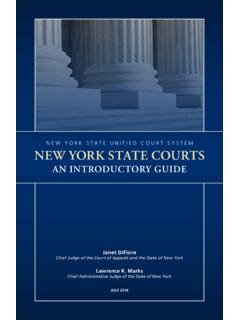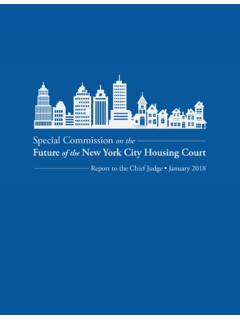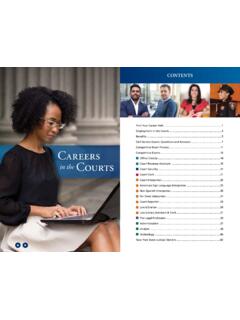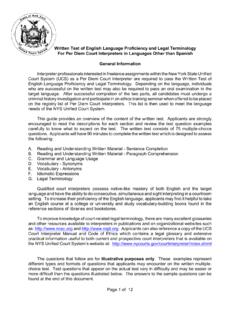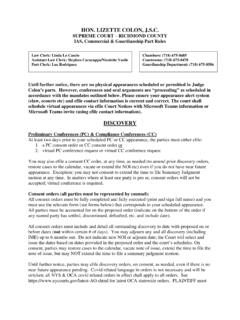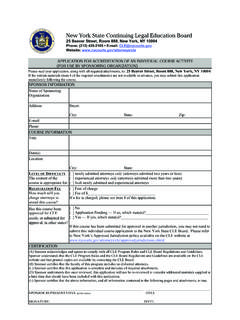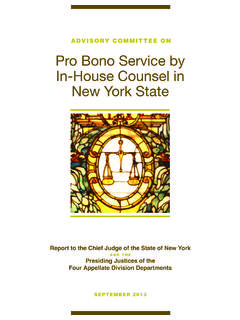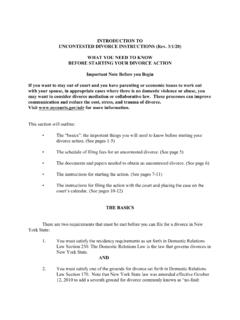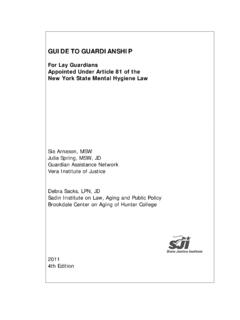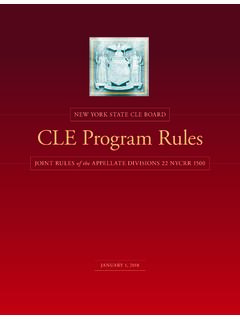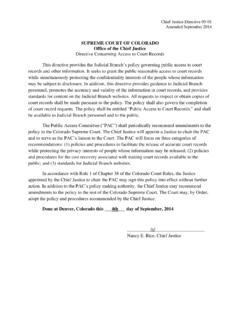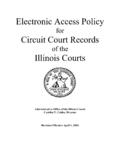Transcription of ACCESS TO COURT RECORDS - ww2.nycourts.gov
1 ACCESS TO COURT RECORDS 1. ACCESS in general While the public has a common law right of ACCESS to COURT RECORDS , that right of ACCESS may be restricted by statute. See Nixon v. Warner Communications, 435 U. S: 597, 598 (1978); Matter of Newsday v. Sise, 71 146, 153 (1987); Matter of New York Post Corp. v. Leibowitz, 2 N . 677, 686 (1957). The Freedom ofInformation Law ("FOIL") specifically exempts COURT RECORDS from disclosure. Public Officers Law 86. Rather, ACCESS to COURT RECORDS is governed by Section 255 of the Judiciary Law.
2 Upon a request and the payment of "the fees allowed by law," Section 255 of the Judiciary Law requires a COURT clerk to "diligently search the files, papers, RECORDS and dockets of his office" and make copies or certify that the RECORDS cannot be found. The request must reasonably describe the specific RECORDS sought, and cannot simply be a request for general information or for the creation or compilation of RECORDS . As to the fees allowed by law, Section 8019(f) of the CPLR indicates that a superior COURT clerk may charge the following: 50 cents per page to prepare a copy of any record or paper, with a minimum fee of $ ; 50 cents per page to certify a prepared copy of any record or paper, with a minimum fee of $4.
3 Pursuant to CPLR 8020(g), the clerk may charge $5 for certifying to a search of RECORDS in a particular COURT for a consecutive two-year period or fraction of that period. CPLR 8016 and various Uniform COURT Acts set forth the fee that clerks of other courts may charge for providing copies of COURT RECORDS . If no such statute sets forth a fee that a clerk may charge for a copy of a COURT record , the clerk may charge the fee that the county clerk may charge for such a service. JudiciaryLaw 255. These fees, in general, are set forth in CPLR Sections 8020 and 8021.
4 2 . Statutory limitations to ACCESS A number of statutes limit ACCESS to COURT reGords where the interest in confidentiality outweighs the public interest in disclosure: A. Family COURT RECORDS ACCESS to COURT RECORDS in the Family COURT is governed by Section 166 of the Family COURT Act, which provides that the RECORDS of any proceeding in Family COURT are not open to indiscriminate public inspection. In order to ACCESS a particular Family COURT record , the requesting party must make an application to the COURT and set forth the reasons for the request.
5 It is solely within the discretion of the COURT whether to permit the inspection of such RECORDS . Certain individuals, such as the parties and their representatives, are permitted ACCESS to Family COURT RECORDS without application to the COURT . 22 B. Sealed RECORDS Several New York statutes require the sealing of the record of a criminal case. Section of the Criminal Procedure Law mandates that a record be sealed when the defendant is acquitted of all charges or the case is dismissed. ACCESS by an individual other than the defendant is not authorized, except for certain law enforcement agencies (see the procedures set forth in CPL [1][dJ).]
6 CPL (2) requires the sealing of a COURT record in a case when the defendant is adjudicated a youthful offender. In addition, if a criminal matter against a juvenile offender is removed to the Family COURT pursuant to CPL Article 725, the record must be sealed. See CPL 430 (1979); Matter of Gannett Co. v. De Pasquale, 43 370 (1977), affd 443 US. 368 (1979). Section 4 of the Judiciary Law provides that the "sittings of every COURT within the state shall be public, and every citizen may freely attend the same," except that the COURT has the discretion to exclude persons who are not directly interested in cases involving "divorce, seduction, abortion, rape, assault with the intent to commit rape, sodomy, bastardy or filiation.
7 " The right of public ACCESS to trials is subject to the COURT 's inherent authority to close a courtroom to preserve order and decorum in the courtroom, to protect the parties and witnesses, and to further the administration of justice. See Matter of Gannet Co. v. De Pasquale, 43 370,377; People v. Jelke, 308 56,63 (1954). This discretion should be exercised only when "unusual circumstances necessitate it, and the COURT must conduct an inquiry to assure that the right to a public trial is not being sacrificed for less then 'compelling reasons.
8 '" People v. Jones, 47 409,413-15, cert. denied, 444 US. 946 (1979). A. Criminal Actions The constitutional provisions at issue in criminal actions involve the defendant's guarantees of a public trial under the Sixth and Fourteenth Amendments. Any restriction on public ACCESS depends upon the balancing of the First Amendment guarantees of public ACCESS with the defendant's guarantees to a public trial and the public interest in closure. Thus, although COURT proceedings are presumptively open, when it would jeopardize a defendant's right to a fair trial, the competing interests must be reconciled.
9 Matter of Gannett Co. v. De Pasquale, 43 370,380. Voir Dire: Jury selection is open to the public and closure is permitted only when there is an overriding interest essential to preserve a higher value and closure is narrowly tailored to serve that interest. Press-Enterprise Co. v. Superior COURT , 464 US. 501, 510 (1984) (setting forth procedures to follow prior to closing voir dire proceedings) . Youthful Offender Proceedings: The sealing provisions of CPL operate only upon a youthful offender adjudication and do not require that the proceedings be closed automatically.
10 See Capital Newspapers Division of the Hearst Corp. v. Moynihan, 125 34 (3d Dept. 1987), affd 71 263 (1988) (setting forth the procedures that must be followed prior to closure of youthful offender proceedings) . Suppression Hearings: The same qualified right of ACCESS to a criminal trial applies to pre-trial suppression hearings in criminal cases. Associated Press v. Bell, 70 32, 38 (1987); Matter of Westchester Rockland Newspapers v. Leggett, 48 430, 440 (1979). However, the countervailing interest is the defendant's right to an impartial jury (one insulated from matters that may ultimately be ruled inadmissable) should the matter proceed to trial.
